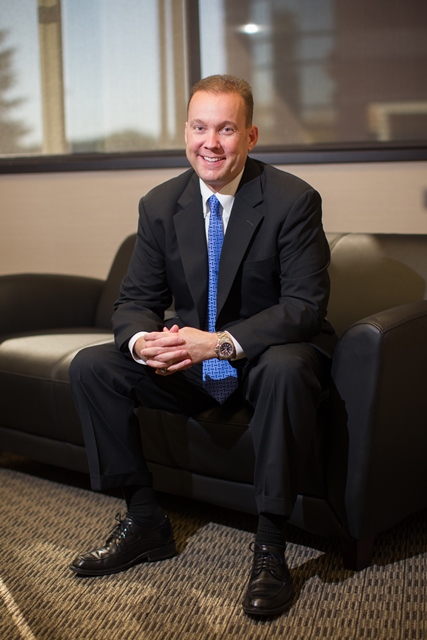Michael Patterson serves as president and CEO of Davenport, Iowa-based Mississippi Valley Health. Through his position, he oversees the Mississippi Valley Surgery Center, Mississippi Valley Endoscopy Center and Mississippi Medical Plaza Development Corp. and its related entities.
During his professional career, he has held various leadership and administrative positions, including executive director and CEO of The Outpatient Surgery Center of Cedar Rapids (Iowa) and vice president of operations and chief nurse executive of Rock Island, Ill.-based Trinity Regional Health System. Mr. Patterson was also a lieutenant commander in the U.S. Navy Reserves before retiring from the service with full honors in 2012.
On Tuesday, April 18, 2017, Mr. Patterson will speak on a panel at the Becker's Hospital Review 8th Annual Meeting. As part of an ongoing series, Becker's is talking to healthcare leaders who plan to speak at the conference, which will take place April 17 through April 20 in Chicago.
To learn more about the conference and Mr. Patterson's panel, click here.
Question: The panel you're speaking on at the April conference is called "The Evolution of ASCs and Physician-Hospital Joint Ventures." How are ASCs and JVs evolving?
Michael Patterson: As payer networks narrow, cost and quality factors continue to evolve and the complexity of health system relationships between providers and hospitals develop, I see JV ASCs as a way to open lines of communication, create greater value from existing resources and strengthen the relationship between hospitals and providers. The community does well when physicians and health systems can align behind common goals of high-quality and cost-effective care.
It is easy to say that, but effectively executing such a strategy can be complex. JVs allow each party to express common and concrete goals around healthcare. JVs are not just "operating agreements" anymore, but are a way by which we can meet a common core of values and develop plans to meet community needs. They can be a powerful vehicle to align resources and plan care for a multitude of patients. JVs continue to evolve as we enter into three-way partnerships with health systems, providers and management companies.
The next evolution of the JV will also include payers as we align around creative methodologies for payment of services and the ability to reach more patients in greater geographic areas.
Q: You've served in the military throughout your career. Could you discuss your decision to serve and your experience?
MP: The military was an opportunity for me as a young person to try and determine what I could be passionate about for a career. It allowed me so many options to explore and ultimately led me to healthcare. I started as an enlisted heavy equipment operator in an amphibious assault unit and ended up as a lieutenant commander working as a trauma nurse specialist and the officer in charge of an expeditionary medical force unit. I was able to see the world, make lifelong friends and impact people from around the globe.
While the military is not for everyone, I thoroughly enjoyed my 23 years and would not be where I am today without that leadership experience and the learning opportunities afforded to me during my military career.
Q: What is one of Mississippi Valley Health's goals for 2017?
MP: MVH takes our mission of "Excellence in Care and Service" seriously. All our strategic and operational decisions have to meet our mission. We have three main focuses:
1.To develop and execute strategies that continue our rich history of high-quality outcomes for our patients.
2. To consider unique opportunities that will position MVH to sustain its mission, create organic growth and sustain our profitability.
3. To execute a master facility plan that positions MVH for the next 20 years, and we want to explore opportunities to engage patients, payers and providers at our facilities. Healthcare facility design is changing rapidly. We want to make sure we are ready for the future of healthcare, and while facility design is one small piece of that, it can be important from a community, physician and patient perspective.
Q: What is one of your daily routines?
MP: My favorite daily routine is breakfast with my five-year-old daughter. I spend many evenings away from home at board meetings, community service meetings and business dinners. I am protective of my morning time with my daughter. We talk about her day at school, what she is learning, what she likes most (which is art and music) and what she likes least (which at this point is boys, but I am sure that will change at some point). It gives me time to reflect on what is most important in life (oftentimes through the eyes of a five-year-old). I like that connection first thing in the morning and she always makes me smile.

